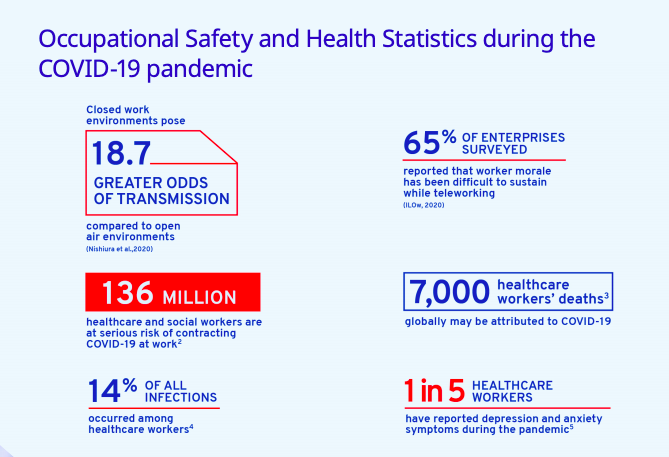On the occasion of World Safety & Health day on April 28th, ILO highlighted the importance of building resilience in order to face crises now and in the future as well as drawing on lessons learned and experiences from the world of work.
In particular, governments, employers, workers and the general population are currently facing unprecedented challenges in relation to the pandemic and the many effects it has had on the world of work.
As such, the ILO Director General, Guy Ryder and a panel of global leaders and senior representatives from governments, employers and workers’ organizations provided perspectives and showcasex how investing in occupational safety and health system contributes to a stronger infrastructure at the national level which is prepared to respond to crises such as COVID-19 and similar events.
Since emerging as a global crisis in early 2020, the COVID-19 pandemic has had profound impacts everywhere. The pandemic has touched nearly every aspect of the world of work, from the risk of transmission of the virus in workplaces, to occupational safety and health (OSH) risks that have emerged as a result of measures to mitigate the spread of the virus. Shifts to new forms of working arrangements, such as the widespread reliance on teleworking, have, for example, presented many opportunities for workers but also posed potential OSH risks, including psychosocial risks and violence in particular.
The World Day for Safety and Health at Work 2021 focuses on leveraging the elements of an OSH system as set out in the Promotional Framework for Occupational Safety and Health Convention, 2006 (No. 187). The world day report examines how the current crisis demonstrates the importance of strengthening these OSH systems, including occupational health services, at both the national and undertaking level.

The Occupational Health Services Convention, 1985 (No. 161) and its accompanying Recommendation (No. 171), provide for the establishment of occupational health services which are entrusted with essentially preventive functions and are responsible for advising employers, workers and their representatives at the enterprise level on maintaining a safe and healthy working environment. In times of crisis such as the COVID-19 pandemic, these services help ensure the continuity of businesses while protecting workers’ health, as they understand the unique needs and risks that workers face.
The Promotional Framework for Occupational Safety and Health Convention, 2006 (No. 187) and its accompanying Recommendation (No. 197) aim at promoting a national preventive safety and health culture, through the establishment of a sound national OSH system.
Building up resilient OSH national systems is essential to deal with crises such as COVID-19, which occur without warning, create new risks for the workforce, and exacerbate existing ones.
.. ILO highlighted.

The ILO said that this is a great opportunity to raise awareness and stimulate dialogue on the importance of creating and investing in resilient OSH systems, drawing on both regional and country examples in mitigating and preventing the Spread of COVID-19 at the workplace.
READ MORE ABOUT RESILIENT OHS SYSTEMS IN ILO REPORT




























































































































